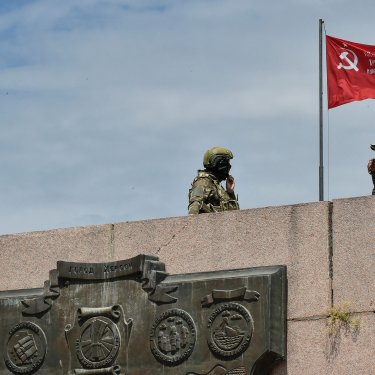Ukraine’s colonisation begins with its Internet

In much of Kherson oblast, in southern Ukraine, all digital roads now lead to Moscow. The Internet is being diverted towards Russian installations and is being subjected to Kremlin censorship. Reporters Without Borders (RSF) condemns this digital colonialism and calls for the liberation of Ukraine’s Internet.
The hijacking of the Internet in Russian-occupied Kherson was first reported by Internet watchdog Netblocks in May and was confirmed in mid-June. This annexation of the Internet in southern Ukraine is depriving its citizens of access to freely reported news and information, RSF says.
“The Russian forces are colonising the Ukrainian digital infrastructure and are installing their telecommunications companies in southern Ukraine,” said Vincent Berthier, the head of RSF’s Tech Desk. “This strategy imposes an alternative reality into which the Kremlin has already plunged its own citizens. Ukraine’s occupied networks must be freed at once. The right of Ukrainian citizens to online access to reliable news and information is a matter of life and death in time of war.”
The Internet is under the Russian military administration’s control in the city of Kherson, in particular. The online news to which its residents have access now passes through two Russian Internet service providers – Miranda Media (which is based in Crimea and which was established in 2014 after Crimea’s annexation by Russia) and Rostelecom, Russia’s leading Internet service provider. And this news is subject to the same draconian digital censorship that RSF already described in a 2019 report (that was updated in 2021).
Access to independent Russian and Ukrainian websites and to most social media including Facebook is either restricted or impossible, depending on the local situation. Unstable connections and limited bandwidth constitute additional obstacles to connecting and to getting information online.
The density of the Ukrainian Internet network makes it harder for the Russian occupiers to gain full control but they are working on it. Two other Russian companies, Volna Mobile and Win Mobile, are also present in the Kherson region and in southern Ukraine’s nearby Melitopol region. The mobile Internet is a strategic target in Russia’s plans to control online news and information in Ukraine.
To this end, the Russian occupiers are forcing southern Ukraine’s residents to apply for a Russian passport. Only those who have one are now able to buy the SIM cards being supplied by the Russian army – cards whose numbers all begin with +7, the Russian Federation’s country code. These cards have no markings and provide no information about their origin or make. Like the hijacking of the Ukrainian Internet itself, such methods help to prevent many Ukrainians from accessing reliable online information.
